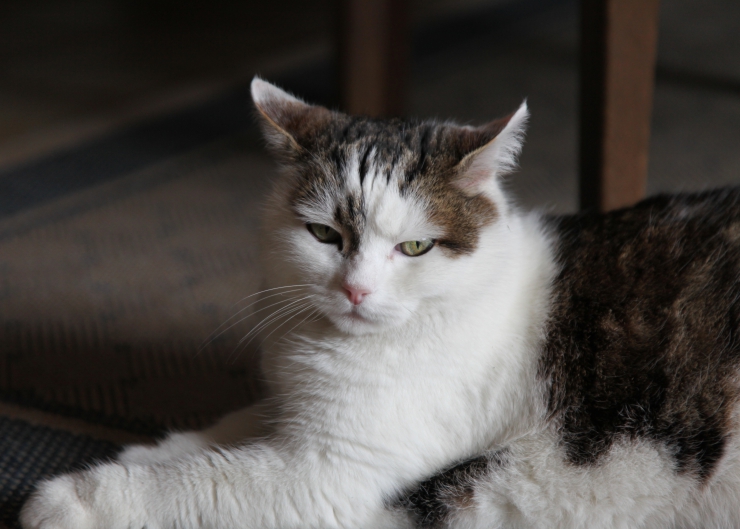If you’ve got an elderly cat, 15 years or over, then you probably already know that she needs extra special care and attention to make sure that her twilight years are happy and comfortable.
It’s a blessing when your beloved companion lives to a ripe old age – here are some helpful tips to help you take care of your elderly cat.
Your Elderly Cat and Eating
Your elderly cat’s dietary needs are different to those of a younger cat; she needs less protein, as too much can make her kidneys work too hard and cause kidney disease, but what protein she does get has to be very high quality.
You may think that she’s become a fussy eater in her old age, but there are a number of reasons why elderly cats seem to struggle with their food. Stiff joints or the onset of arthritis will make it harder to eat from her usual bowls, so slightly raise her food and water bowls to make it easier.
A reduced sense of smell as she gets older might also lead to what seems like a loss of appetite, and adding a little bit of a smelly food like tuna or salmon oil to her usual meals will help with that.
Dental problems are also more common the older a cat gets, so eating might cause her pain and discomfort, and that’s why it’s especially important for your cat to have regular check-ups at the vet to keep an eye on her teeth and gums.
Of course, your cat is going to become less active as she gets older, so she’ll naturally start to need less food. If you’re worried in any way about a change in her appetite, it’s always best to get a vet’s opinion.

Your Elderly Cat and Hygiene
You’ll probably notice your elderly cat grooming less and missing out certain areas, and that’s because she’s finding it harder to move her body around and reach everywhere she needs to. You’ll need to give her a helping hand as she gets older by grooming her regularly.
Litter tray issues get more common as a cat gets older too, with incontinence, cystitis and diarrhoea all common problems for elderly cats.

Your Elderly Cat’s Mobility and Activity
As cats get older they naturally start to slow down, their joints and muscles are aging and their senses of sight and smell are diminishing, so they’re less likely to hunt. You should still try to encourage your elderly cat with some light play, because it’s good for both exercise and mental stimulation.
She might start to struggle getting up and down stairs, so make sure that you have litter trays on every floor in your house to avoid unintentional accidents.
Your Elderly Cat and Sleep
Your cat will spend most of her time sleeping as she gets older, and you need to think more carefully about her sleeping areas. Her ability to regulate her body temperature will have decreased, and she’ll probably be thinner than she once was, so any sleeping areas need to be soft, comfy and warm.

Senile Behaviour in Elderly Cats
A lot of cats get upset at a change in their routine, and this only increases as they get older. You might notice excessive vocalisation at night – your cat will be feeling more dependent on you so when you’re sleeping she might worry and need the reassurance that you’re there. Letting her sleep in bed with you will help to a point, but this vocalisation can also be caused by hearing loss or hyperthyroidism, which is a common condition in elderly cats.
You might also notice general confusion in your elderly cat, and it’s been suggested that senile cats’ behaviour is similar to dementia in humans.

